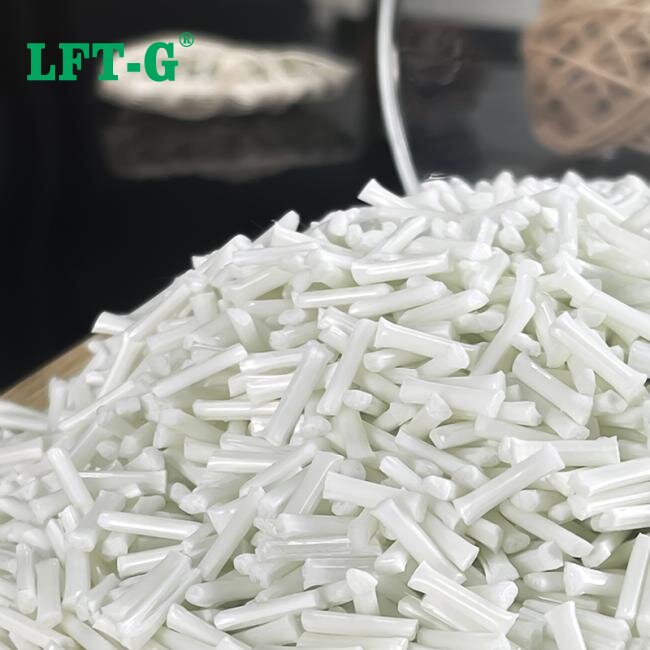
As one of the most widely used nylon products, PA66 is renowned for its high strength, excellent wear resistance, and superior lubricity, making it widely applicable in fields such as engineering plastics, industrial yarns, and civilian threads. According to market data, approximately 59% of global PA66 consumption is used in engineering plastics, while 41% is utilized in synthetic fibers.

Long Glass Fiber Reinforced PA 66
01|Engineering Plastics
Approximately 45% of PA66 is used in the automotive industry, while around 16% is applied in the electrical and electronics industry.
With the rising penetration of new energy vehicles, the trend toward automotive lightweighting has become increasingly prominent. As an engineering plastic, PA66 stands out as an ideal substitute for traditional metal materials due to its advantages in lightweight properties, heat resistance, oil resistance, and flame retardancy. It is widely used in automotive engine systems, electrical systems, chassis systems, and more, showcasing a broad potential for "plastic replacing steel" applications.
Studies show that reducing the total weight of a new energy vehicle by 100kg can increase its driving range by 10%-11%, while also reducing battery costs and daily wear-and-tear costs by 20%, highlighting the significant advantages of lightweighting. As carbon neutrality continues to advance, the demand for PA66 in automotive, electronic, and consumer goods sectors is expected to grow significantly.
The table below illustrates examples of PA66 applications in the automotive industry:
Component Name |
Material Used |
Molding Method and Features |
|---|---|---|
Gear Cover |
PA6, PA66 |
Injection molding, cost reduction, noise prevention |
Filter |
PA6, PA66 |
Lightweight, cost reduction, injection molding |
Sun Visor Bracket |
GFPA6, PA66 |
Injection molding, lightweight |
Wiper Gear |
PA66 |
Injection molding |
Counting Gear, Speed Adjustment Gear |
GFPA6, PA66 |
Injection molding, cost reduction, noise prevention |
Headlight and Fog Light Housings |
GFPA6, PA66 |
Injection molding |
Auto-Adjust Seat Frame |
Antibacterial GFPA6 |
Injection molding, lightweight |
Battery Case |
GFPA66 |
Injection molding |
Wheel Trim Cover |
CF or MPA6, PPO/PA6 modified PA66 |
Injection molding |
Lunar Lock |
GFPA66 |
Injection molding, high strength, good appearance |
Charcoal Canister |
PA66 |
Heat and oil resistance, prevents fuel tank vapor diffusion into the atmosphere |
Hose Clamp |
PA66 |
Injection molding |
Condenser Guard Bracket |
PA66 |
Injection molding |
Nut Plug |
PA66 |
- |
Plastic Bracket |
PA66 |
Injection molding |
Support Clamp |
PA66 |
Injection molding |
Accelerator Pedal Bearing Sleeve |
30% GFPA66 |
- |
Air Conditioner Vent Control Lever |
30% GFPA66 |
- |
Worm Gear |
GFPA66 |
Injection molding |
Door Mirror Bracket |
GFPA66 |
Injection molding |
Roof Spoiler |
CFPA66 |
High rigidity, good appearance |
Roof Rainwater Gutter |
GFPA66 |
High rigidity, lightweight |
Adjustment Control Cam |
GFPA66 |
Injection molding, lightweight, durable |
Thermostat Housing Cover |
GFPA66 |
Injection molding, lightweight, strong durability |
Water Pump Impeller |
GFPA66 |
Injection molding, cost reduction |
Handle |
GFPA66 |
- |
Seat Back Recliner |
CFPA66 |
Saves 1/3 of costs |
Lumbar Support Adjuster |
PA |
Weight reduction by 67% |
Various Wheels, Rollers, Gears |
MC Nylon, GFPA |
High strength, excellent wear, weather, and sliding resistance |
02|Synthetic Fibers
Due to its high melting point and heat distortion temperature, PA66 exhibits excellent tensile and compressive strength in the spinning field, making it particularly advantageous for producing ultrafine fibers and high-strength clothing fabrics, accounting for 28% of PA66 downstream applications.
Moreover, PA66 fibers have a relatively dense crystalline structure, making them softer and more skin-friendly compared to PA6 fibers. With superior breathability, wear resistance, and adaptability to temperature and sunlight, PA66 fibers perform exceptionally well as an ideal material for outdoor sportswear, yoga apparel, and premium branded clothing, accounting for 10% of PA66 downstream applications.
However, due to the limited supply of upstream adiponitrile, the current application of PA66 in civilian silk remains relatively low. If breakthroughs in civilian silk technology are achieved in the future, PA66 is expected to partially replace the PA6 market, unlocking broader growth potential.
In summary, as "carbon neutrality" continues to advance, there is significant growth potential for PA66 demand in the automotive and electronic consumer goods sectors. Additionally, in the civilian silk sector, PA66 is poised to partially replace the PA6 market.
For PA66 resin, we offer reinforced composite pellets filled with long glass fibers and long carbon fibers.
Please contact us to obtain free material data.